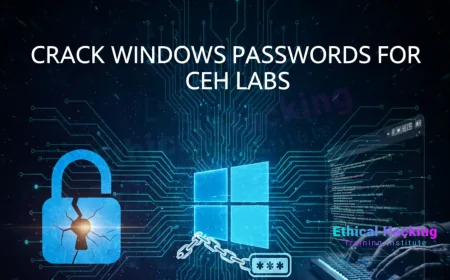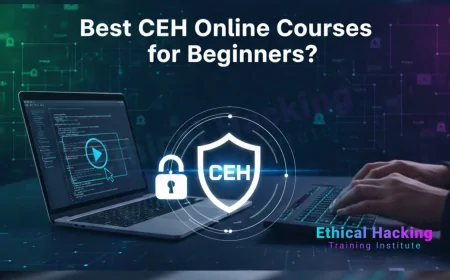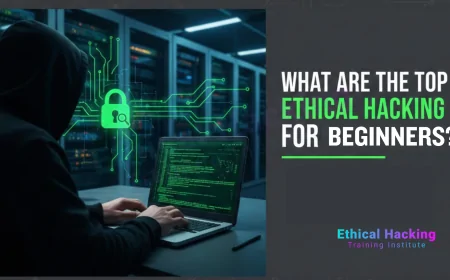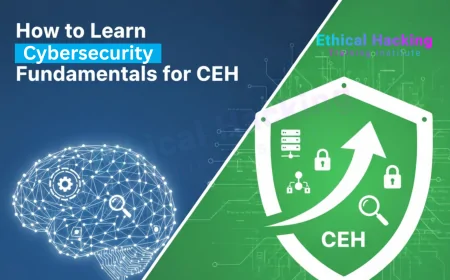Learn Hacking with These Comprehensive Courses and Certifications | From Beginner to Pro: Hacking Courses and Certifications That Teach Real Skills
Learn ethical hacking with the best courses and certifications in 2025. Start from beginner to pro with hands-on training, real tools, and job-ready skills.
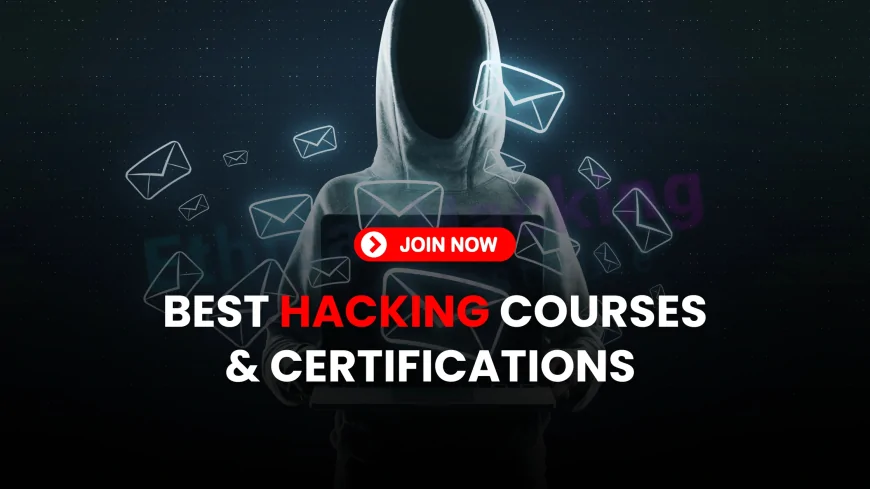
Table of Contents
- Introduction
- What is Ethical Hacking?
- Why Learn Hacking in 2025?
- Types of Hacking Courses
- Top Online Hacking Courses in 2025
- Top Hacking Certifications You Should Consider
- Essential Tools Taught in Hacking Courses
- Real-World Skills You Will Gain
- Career Opportunities After Certification
- Tips for Choosing the Right Hacking Course
- Free vs Paid Hacking Courses
- Learning Path: Beginner to Pro Ethical Hacker
- Why Hands-On Projects Matter
- How to Prepare for Hacking Certification Exams
- The Future of Hacking and Cybersecurity
- Importance of Community and Mentorship
- Cost and Duration of Courses
- FAQs
- Conclusion
Introduction
With cyber threats on the rise, ethical hacking has evolved from a niche skill into a mainstream career. Whether you're an IT enthusiast, a student, or a professional switching domains, learning ethical hacking can open doors to exciting job opportunities and high-paying roles. This guide presents the most comprehensive hacking courses and certifications available in 2025.
What is Ethical Hacking?
Organizations use ethical hacking to evaluate their cyber defenses by allowing professionals to attempt legal breaches under controlled conditions. Certified Ethical Hackers (CEHs) use the same techniques as malicious hackers—like scanning, footprinting, and penetration testing—but do so to improve security.
Why Learn Hacking in 2025?
-
Global cybercrime is projected to cost over $10.5 trillion annually by 2025.
-
Shortage of 3.5 million cybersecurity jobs worldwide.
-
The demand for ethical hackers results in competitive pay, with average salaries spanning ₹8 to ₹20 lakhs annually in India.
-
Increasing digitization demands skilled professionals in network security, cloud protection, and incident response.
Types of Hacking Courses
-
Beginner-Level Courses – Basics of cybersecurity and computer networks.
-
Intermediate Courses – Penetration testing, wireless hacking, web app vulnerabilities.
-
Advanced Courses – Red teaming, ethical malware analysis, exploit development.
-
Specialized Courses – Cloud security, mobile hacking, IoT security, OSINT.
Top Online Hacking Courses in 2025
1. Certified Ethical Hacker (CEH v13) – EC-Council
-
Globally recognized.
-
Teaches vulnerability scanning, social engineering, footprinting, and more.
-
Includes 20 hacking domains.
2. Offensive Security Certified Professional (OSCP)
-
Known for its practical, hands-on approach.
-
Prepares you for real cybersecurity incidents by replicating the complexity of real-world breaches.
3. Google Cybersecurity Professional Certificate
-
Beginner-friendly.
-
Covers cybersecurity foundations, including risk assessment and incident response.
4. TryHackMe & Hack The Box
-
Virtual labs and challenges.
-
Excellent for practical skills and capture-the-flag (CTF) training.
5. Udemy: The Complete Ethical Hacking Bootcamp
-
Affordable and regularly updated.
-
Lifetime access to real-time labs and demonstrations.
Top Hacking Certifications You Should Consider
| Certification Name | Issued By | Skill Level |
|---|---|---|
| CEH (Certified Ethical Hacker) | EC-Council | Intermediate |
| OSCP (Offensive Security Certified) | Offensive Security | Advanced |
| CompTIA Security+ | CompTIA | Beginner |
| CISSP | ISC2 | Expert |
| eJPT (eLearnSecurity Junior Pen Tester) | INE | Intermediate |
Essential Tools Taught in Hacking Courses
-
Kali Linux – Pre-loaded with 600+ tools.
-
Wireshark – Packet analysis.
-
Metasploit – Exploit development.
-
Burp Suite – Web app vulnerability testing.
-
Nmap – Network scanning and mapping.
-
Security Onion – Network monitoring and threat detection.
Real-World Skills You Will Gain
-
Vulnerability assessment
-
Web application testing
-
Social engineering tactics
-
Wireless hacking
-
Reverse engineering malware
-
Cloud security auditing
Career Opportunities After Certification
-
Penetration Tester
-
Ethical Hacker
-
Cybersecurity Analyst
-
Security Consultant
-
SOC Analyst
-
Red Team Operator
-
Bug Bounty Hunter
Tips for Choosing the Right Hacking Course
-
Check if it includes real-world labs.
-
Prefer instructor-led training or mentorship support.
-
Ensure it covers up-to-date tools and current vulnerabilities.
-
Look for certification-based outcomes.
-
Choose platforms with community access or peer forums.
Free vs Paid Hacking Courses
| Criteria | Free Courses | Paid Courses |
|---|---|---|
| Content Depth | Basic to intermediate | Intermediate to advanced |
| Certification | Rare | Often included |
| Hands-On Labs | Limited | Full access to labs |
| Community/Support | Limited forums | Dedicated mentor support |
| Examples | YouTube, Cybrary Free, TryHackMe Free | EC-Council, Offensive Security, INE |
Learning Path: Beginner to Pro Ethical Hacker
-
Learn Networking & Linux Basics
-
Understand Cybersecurity Fundamentals
-
Practice on TryHackMe or Hack The Box
-
Take CEH or Security+
-
Advance with OSCP or CISSP
-
Specialize in cloud, web, or malware hacking
Why Hands-On Projects Matter
-
Increases retention by 80% compared to theory.
-
Prepares you for real-world attacks.
-
Builds confidence for job interviews.
-
Enhances resume and portfolio with tangible results.
How to Prepare for Hacking Certification Exams
-
Practice daily in virtual labs.
-
Use official courseware.
-
Join online communities and forums.
-
Watch video tutorials and take mock tests.
-
Simulate CTFs and scenario-based testing.
The Future of Hacking and Cybersecurity
-
Rise in AI-powered cybersecurity attacks.
-
Demand for cloud penetration testers.
-
Increase in zero-trust architecture.
-
Evolution of quantum-safe encryption.
Importance of Community and Mentorship
-
Get support and answers quickly.
-
Participate in CTFs and global competitions.
-
Network with professionals for career opportunities.
-
Find mentors and career coaches.
Cost and Duration of Courses
| Course Name | Estimated Cost | Duration |
|---|---|---|
| CEH v12 | ₹50,000 – ₹1,00,000 | 3–6 months |
| OSCP | ₹90,000 – ₹1,50,000 | 3–9 months |
| TryHackMe Premium | ₹700/month | Self-paced |
| Google Cybersecurity | ₹5,000 approx. | 3 months |
| Udemy Bootcamps | ₹499 – ₹5,000 | 2–6 months |
FAQs
1. What is ethical hacking?
Ethical hacking involves authorized attempts to gain access to a system’s data or functions to identify and fix security vulnerabilities.
2. Can I learn hacking without prior IT experience?
Yes, many beginner-friendly courses introduce hacking basics, computer networks, and Linux from scratch.
3. Which is the best ethical hacking certification in 2025?
CEH v12 by EC-Council and OSCP by Offensive Security are the most in-demand certifications in 2025.
4. How long does it take to become a certified ethical hacker?
It typically takes 6 to 12 months of consistent learning and hands-on practice to become certified.
5. Are online ethical hacking courses worth it?
Yes, online courses from reputable platforms offer flexibility, labs, certifications, and job-ready skills.
6. What tools do I need to learn ethical hacking?
Common tools include Kali Linux, Wireshark, Nmap, Metasploit, Burp Suite, and John the Ripper.
7. Is ethical hacking legal in India?
Yes, ethical hacking is legal when performed with permission and for defensive security purposes.
8. Do ethical hackers get paid well?
Yes. Ethical hackers in India earn between ₹8 LPA to ₹20 LPA, and globally it can exceed $100,000 annually.
9. What’s the difference between ethical hacking and penetration testing?
Penetration testing is a subset of ethical hacking focused on simulating real attacks to find vulnerabilities.
10. Are there any free ethical hacking courses available?
Yes, platforms like TryHackMe, Cybrary, and YouTube offer free beginner-friendly ethical hacking content.
11. Can I become a freelancer as an ethical hacker?
Absolutely. Many ethical hackers work independently through freelancing or bug bounty platforms like HackerOne.
12. What is the CEH certification?
The CEH (Certified Ethical Hacker) by EC-Council validates your ability to identify and fix security threats using modern tools.
13. How difficult is the OSCP exam?
The OSCP is considered one of the most challenging hacking certifications due to its 24-hour hands-on practical exam.
14. What programming languages should ethical hackers learn?
Python, Bash, JavaScript, and SQL are commonly used for scripting and automation in ethical hacking.
15. Can ethical hacking be self-taught?
Yes, many professionals are self-taught through online resources, virtual labs, and community forums.
16. Do ethical hacking courses offer hands-on practice?
The best courses include real-world labs, CTF challenges, and simulation environments for practical experience.
17. What is a bug bounty program?
A bug bounty program rewards ethical hackers for reporting security flaws in a company’s system or application.
18. Are ethical hackers in demand in 2025?
Yes, the demand for cybersecurity professionals and ethical hackers is at an all-time high and growing rapidly.
19. Can I get a job after completing a hacking course?
Yes. Many courses offer job placement support and career services to help learners transition into the industry.
20. What are the career paths after learning ethical hacking?
You can become a Penetration Tester, Cybersecurity Analyst, Red Teamer, SOC Analyst, or Security Consultant.
Conclusion
Ethical hacking isn't just a trend—it's a critical skill for protecting digital infrastructure. Whether you're a beginner looking to start or a pro seeking certifications, comprehensive hacking courses and globally recognized certifications can set you up for a rewarding cybersecurity career. Invest in practical learning, build real-world projects, and stay current with evolving threats to become an elite ethical hacker in 2025.
What's Your Reaction?
 Like
0
Like
0
 Dislike
0
Dislike
0
 Love
0
Love
0
 Funny
0
Funny
0
 Angry
0
Angry
0
 Sad
0
Sad
0
 Wow
0
Wow
0






